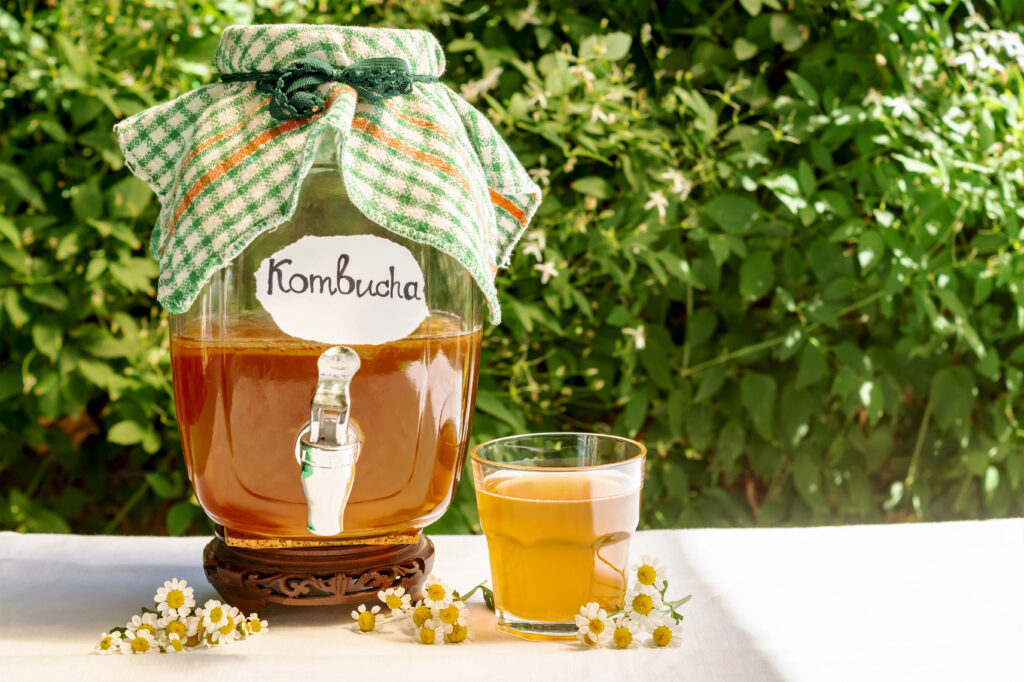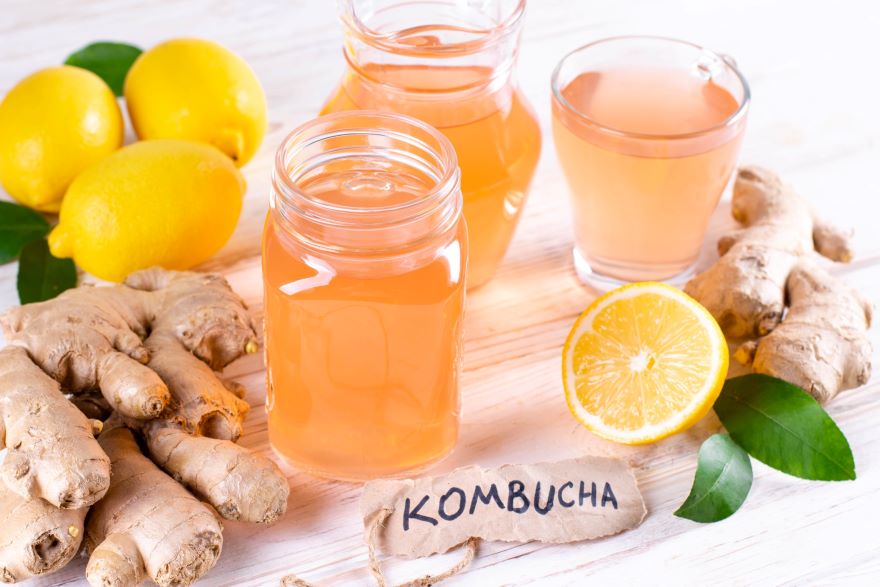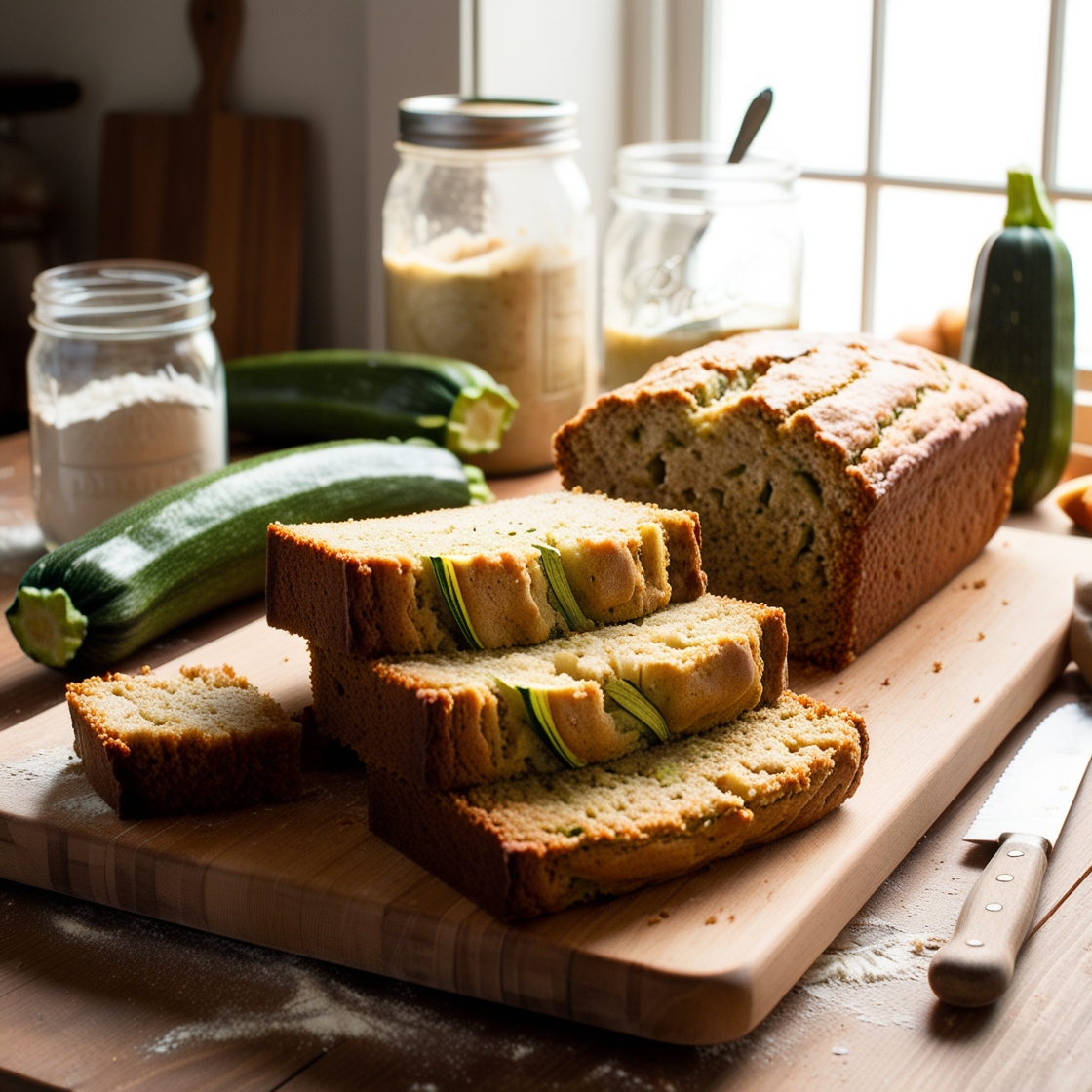Who would’ve thought that a weird-looking, fizzy drink would change my life? Not me, that’s for sure. But here I am, absolutely hooked on kombucha, and I can’t stop talking about it. Let me tell you how this fermented tea became my gluten-free salvation and opened up a whole new world for me.

The Day Kombucha Found Me
There I was, wandering aimlessly through the health food store, feeling sorry for myself. My recent celiac diagnosis had turned grocery shopping into a frustrating scavenger hunt. Everything I loved seemed off-limits. Then, like a beacon of hope, I spotted it—a bottle labeled “gluten-free kombucha.”
I’ll be honest, I was skeptical. The drink looked… well, alive. Tiny bubbles raced to the top, and was that stuff floating in it? But desperation won out over doubt, and I decided to give it a shot.
That first sip? Mind-blowing. It was tangy, sweet, and bubbly all at once. My taste buds did a happy dance, and for the first time since my diagnosis, I felt like I wasn’t missing out. Little did I know, this was just the beginning of my kombucha obsession.
Falling Down the Kombucha Rabbit Hole
My Kitchen Turns into Kombucha Central
Eventually, reading labels wasn’t enough. I wanted to make my own kombucha. How hard could it be, right? Oh, sweet summer child…
My first attempt was a disaster. It tasted like vinegar mixed with old socks. The second batch? Let’s just say it might have been alive. Failure only fueled my determination. I kept at it, tweaking and adjusting until finally, on my third try, magic happened. I’d created a kombucha that wasn’t just drinkable—it was downright delicious.
Ready to dive into home brewing? This premium kombucha kit has everything you need to get started on your fermentation journey.
- INCLUDES PREMIUM WRAP WITH PRECISE TEMPERATURE CONTROL: Four temperature settings to always keep the ideal brew temperature no matter the time of year. Our unique design includes a built in, adjustable hook-and-loop strap to easily and snugly fit your brewing vessel
- INCLUDES TEA FOR BREWING 10 ADDITIONAL GALLONS - This loose leaf blend of organic Ceylon and Oolong teas is specifically formulated for kombucha home brewing so you get delicious results every time you brew
- BUNDLE & SAVE - Our Kombucha Brewing bundle offers the Deluxe Kombucha Brewing kit, our Premium Heating Wrap and enough of our Original Organic Kombucha Tea Blend to brew 10 additional gallons. Save with this bundle!
- EVERYTHING TO BREW & BOTTLE: Save money and time purchasing all of the equipment to brew and bottle in one custom kit. Our Deluxe Brewing Kit includes six 16 oz. Swing Top Bottles made of thick glass with a strong gasket. The perfect bottles for making fizzy and delicious Kombucha
- THE PERFECT PRESENT: This complete and beautiful kit is sure to be the perfect present for any kombucha fan in your life. All of our kits are entirely shelf stable so you can order and ship worry free! They'll love it, we promise.
The Recipe That Started It All
After much trial and error, I nailed down my go-to kombucha recipe:
- 4 cups of filtered water
- 4 bags of organic black tea (no sneaky additives!)
- 1/4 cup organic cane sugar
- 1/2 cup of starter tea from a previous batch (or store-bought raw kombucha)
- 1 SCOBY (aka, the weird floaty thing)
The process? Brew the tea, dissolve the sugar, let it cool, then add the starter tea and SCOBY. Cover it up and let it sit for 7-10 days. Patience is key here, folks.
This basic recipe became my playground. I started experimenting with different teas and flavors, always keeping it gluten-free. My current obsession? A zingy ginger and organic green tea kombucha that’s like a party in my mouth.
But why stop at one recipe when the kombucha world is your oyster? Let me share two more of my absolute favorites that’ll knock your socks off.

Tropical Paradise Kombucha
Who says you need a plane ticket to feel like you’re on vacation? This recipe brings the beach to your taste buds:
- 4 cups of filtered water
- 3 bags of organic green tea
- 1 bag of hibiscus tea
- 1/4 cup organic cane sugar
- 1/2 cup of starter tea
- 1 SCOBY
- For flavoring: 1/4 cup each of chopped pineapple and mango
Follow the basic brewing process, but here’s where the magic happens: After the initial fermentation, strain out the SCOBY and add the chopped fruit. Let it sit for another 2-3 days, then strain and bottle. The result? A vibrant, fruity kombucha that’ll transport you straight to a tropical island. It’s like a piña colada’s health-conscious cousin!
Spiced Chai Kombucha
For those chilly days when you need a warm hug in a glass, this spiced chai kombucha hits the spot:
- 4 cups of filtered water
- 2 bags of organic black tea
- 2 bags of caffeine-free Rooibos chai tea
- 1/4 cup organic cane sugar
- 1/2 cup of starter tea
- 1 SCOBY
- For flavoring: 1 cinnamon stick, 2 cardamom pods, 1 star anise
Brew as usual, but add the spices during the second fermentation. After 2-3 days, remove the spices, strain, and bottle. The result is a wonderfully aromatic kombucha with warm, spicy notes that’ll make you feel all cozy inside.
Both these recipes are 100% gluten-free and pack a flavorful punch. They’ve become my go-to brews when I’m craving something a little different from my standard ginger green tea kombucha.
Upgrade your kombucha brewing setup with this high-quality glass jar. Perfect for larger batches and easier SCOBY maintenance.
- You will receive 4 jars - Made in the USA - DIMENSIONS for each jar: 10" tall, 4" wide opening
- Generous 128 oz. Capacity: Each jar has a spacious 1 Gallon capacity, providing ample storage for your favorite beverages, preserves, and more.
- Clear Glass Construction: The clear glass material not only looks great but also allows for a clean and aesthetically pleasing appearance. Crafted with superior quality craftsmanship in the USA.
- Airtight Seal with Foam Lined Lid: The White Polypropylene Ribbed Lined PE Foam lid ensures an airtight seal, preserving the freshness of your contents. The textured top and ribbed sides make lid removal easy.
- Wide Mouth Opening (110 mm): The wide mouth design facilitates easy access for filling and retrieval, making it ideal for canning whole fruits and vegetables. Convenient for use with hands or various kitchen utensils.
Brewing Beyond Recipes: My Kombucha Flavor Journey
As I experimented with these recipes, I noticed how each unique combination of ingredients affected not just the taste but also how I felt after drinking them. The tropical paradise kombucha became my summer afternoon pick-me-up, while the spiced chai version turned into my comforting evening ritual.
Creating these recipes wasn’t just about the end product, though. It was about the process—the anticipation as I waited for each batch to ferment, the excitement of that first taste, and yes, even the occasional disappointment when an experiment didn’t quite work out. Each brew taught me something new, not just about kombucha but about myself and my relationship with food.
Kombucha: The Gift That Keeps on Giving
As I continued my Kombucha journey, I noticed some unexpected perks. My digestion improved, and I had energy for days. But the benefits went beyond the physical.
Making kombucha became my Zen time. The process of brewing, waiting, and tasting connected me to my food in a way I’d never experienced. I became more mindful of what I was putting into my body and how it made me feel. This newfound awareness spilled over into other areas of my life. I started exploring other gluten-free fermented foods like sauerkraut and kimchi. My kitchen transformed into a science lab of bubbling jars and strange smells, much to my family’s amusement (and occasional horror).
Spreading the Kombucha Love
Soon, I couldn’t keep my kombucha enthusiasm to myself. I started bringing bottles to gatherings, always with a disclaimer about their unique taste. To my surprise, people loved it. Friends with gluten sensitivities were especially grateful to have a fun, fizzy drink option.
Before I knew it, I’d started a Kombucha club in my neighborhood. Once a month, we get together to swap recipes, trade scobys, and taste each other’s creations. It’s become this amazing community of health-conscious folks supporting each other. Who knew fermented tea could bring people together like this?
The Nerdy Side of Kombucha
As I fell deeper into the kombucha rabbit hole, I got fascinated by the science behind it. Studies have shown that kombucha is packed with probiotics, which are great for gut health. The fermentation process also creates organic acids and antioxidants that might have all sorts of health benefits. One thing that really excited me was learning about kombucha’s potential immune-boosting properties. As someone with celiac disease, anything that could give my immune system a leg up was a welcome addition to my diet.

When Life Gets Hectic: My Favorite Store-Bought Kombucha
Look, I’m all about that home-brewed kombucha life. There’s something magical about nurturing your own SCOBY and experimenting with flavors. But let’s be real—sometimes life throws you a curveball, and you’re left scrambling for a quick probiotic fix.
On those crazy days, I’ve got a secret weapon: this amazing apple-flavored kombucha I found at the grocery store. It’s like autumn in a bottle, with a crisp, tart kick that makes my taste buds do a little happy dance. Plus, it checks all my health-nut boxes—organic, non-GMO, gluten-free. You know, the works.
Now, if you’re new to the fizzy, fermented world of kombucha or just want to shake up your routine, I’ve got a pro tip for you. Grab yourself a variety pack of this stuff. It’s usually a 12-pack with different fruit flavors, perfect for figuring out what tickles your fancy. And hey, it’s still got all those good-for-your-gut benefits without any gluten sneaking in.
Trust me, once you find that perfect store-bought kombucha, it’s like having a little bottle of Zen waiting for you in the fridge. It might not have the same bragging rights as homemade, but on those days when you’re running on fumes? It’s an absolute lifesaver.
- Your Daily Probiotic: Probiotics are living bacteria that are known to improve gut health. When consumed, they contribute to a diverse microbiome which helps the rest of your body stay balanced.
- Gut Healthy Acids: During the fermentation process organic acids like acetic, lactic, gluconic and glucuronic acid are produced. These powerful “postbiotics” complete the many functions attributed to gut health.
- Natural Antioxidants: Antioxidants make up your body's clean-up crew. These plant-based substances are known to support your body's overall health and wellbeing.
- Real Fruit Juice: Our kombucha is flavored with real fruit juice from organic produce for a deliciously refreshing taste.
- No Artificial Sweeteners, Flavors, or Colors: Enjoy Health-Ade as a better-for-you alternative to your favorite bubbly beverage. Containing far less sugar than the average soda, Health-Ade Kombucha supports multiple functional benefits and is never made with any artificial sweeteners, flavors, or colors.
The Journey Continues
My kombucha adventure has taught me so much—patience, experimentation, and the joy of creating something with my own hands. It’s shown me that living gluten-free doesn’t mean living flavor-free. Every time I crack open a bottle of my homemade kombucha, I’m amazed at how far I’ve come.
If you’re curious about trying kombucha or adding it to your gluten-free lifestyle, I say go for it! Whether you start with a store-bought bottle or dive into home brewing, approach it with an open mind and a sense of adventure.
Remember, everyone’s journey is different. What works for me might not work for you, and that’s okay. The fun is in the discovery—new flavors, new habits, and maybe even new aspects of yourself.
So, is kombucha gluten-free? In its traditional form, absolutely. But it’s so much more than that. It’s a gateway to a world of gut-healthy, flavorful possibilities. It’s proof that dietary restrictions don’t have to limit your enjoyment of food and drink.
Why not give kombucha a try? Your taste buds—and your gut—might just throw you a thank-you party. And who knows? You might find yourself on your own transformative journey, one fizzy sip at a time.

*We may earn a commission for purchases made using our links. Please see our disclosure to learn more.






